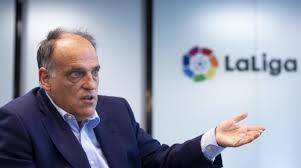By Andrew Warshaw
Januuary 21 – No sooner have we entered a new decade than outspoken Spanish league boss Javier Tebas is back on the offensive, this time slamming proposals both for a revamped Champions League and FIFA’s expanded Club World Cup and renewing his attack on what he has long described as “financial doping”.
Recently elected for a further four-year term, Tebas was in London recently for the launch of his TV channel, La Liga TV, but wasted no time using the opportunity to speak his mind on the destabilising effect of the money-driven dominance of Europe’s biggest clubs and the growing disparity between them and the rest.
“I don’t think we are helping football in any way if we generate wealth and it just goes straight back to the big clubs but that’s what’s happening, the major clubs share out the large part of the income among their players,” Tebas was quoted as telling reporters.
“In the end instead of having 12 Ferraris, they have 15. Instead of having 10 Lamborghinis, they have 12. We’re dealing with major clubs generating a huge amount of money. So our aim is to redistribute that wealth.”
Driven by Gianni Infantino, FIFA has decided to turn the Club World Cup from its virtually redundant seven-team format between regional champions into a 24-team event, starting in China, while talks between UEFA and the European Clubs Association are ongoing to reform the Champions League from 2024.
Tebas is worried about all this, not least FIFA’s growing influence in club football and possibility of the new-look Club World Cup taking place every two years instead of four.
“We had a balance, an ecosystem between the different leagues in Europe and other continents, and now we have an intruder which might disrupt that balance,” he said.
“FIFA is supposed to be a regulatory body. But they have shifted from arranging calendars and organising World Cups to talking about having a Club World Cup every two years. That would change the status quo. We can’t let that happen.”
“I think it’s striking, a few weeks ago, FIFA was talking about how much would be paid if they went to China. They have been talking about redistribution of revenue, but haven’t discussed the impact this would have in different countries. Having been re-elected, I am very critical of the Club World Cup, and how this whole process has come out.”
Tebas also renewed his attack on the likes of Qatari-owned Paris St Germain and Abu Dhabi-backed whom has accused in the past of being virtually state-financed to the detriment of everyone else. PSG were cleared of any wrongdoing in 2018 although suspicions remain while in November City lost their appeal to the Court of Arbitration for Sport (CAS) to halt UEFA’s investigation into alleged financial fair play irregularities.
Reports allege City deliberately misled UEFA so they could meet FFP rules requiring clubs to break even. City have long insisted that the accusations “remain entirely false” but Tebas believes the ultimate sanction of being thrown out of Europe should apply if any violations are proved to have taken place.
“One of the major issues in European football is related to (financial) doping. Because when we have clubs being financed by states then that has an impact on salaries,” said Tebas.
“Obviously a sanction needs to be imposed… I do know the Manchester City figures, where their income comes from and that figures don’t add up to a certain extent.”
UEFA, charged Tebas, were not being firm enough.
“’I think in some cases (UEFA) have dealt with some FFP cases in the right way and for that they should be congratulated but there are two specific cases, Manchester City and PSG, which I think are not being dealt with correctly,” he declared.
“That’s not just my opinion it’s also members of the UEFA financial committee who thought it would be a good idea to open up the PSG case again.”
Tebas also joined the chorus of disapproval over the recent staging of the Spanish Super Cup in Saudi Arabia.
“The Saudi Arabian government has a policy whereby they improve the image of the government through sport, whitewashing their image and we all have a responsibility there. One thing is to sell our broadcasting rights and the other thing is to go to that country where there are issues around human rights.”
Contact the writer of this story at moc.l1745199243labto1745199243ofdlr1745199243owedi1745199243sni@w1745199243ahsra1745199243w.wer1745199243dna1745199243

